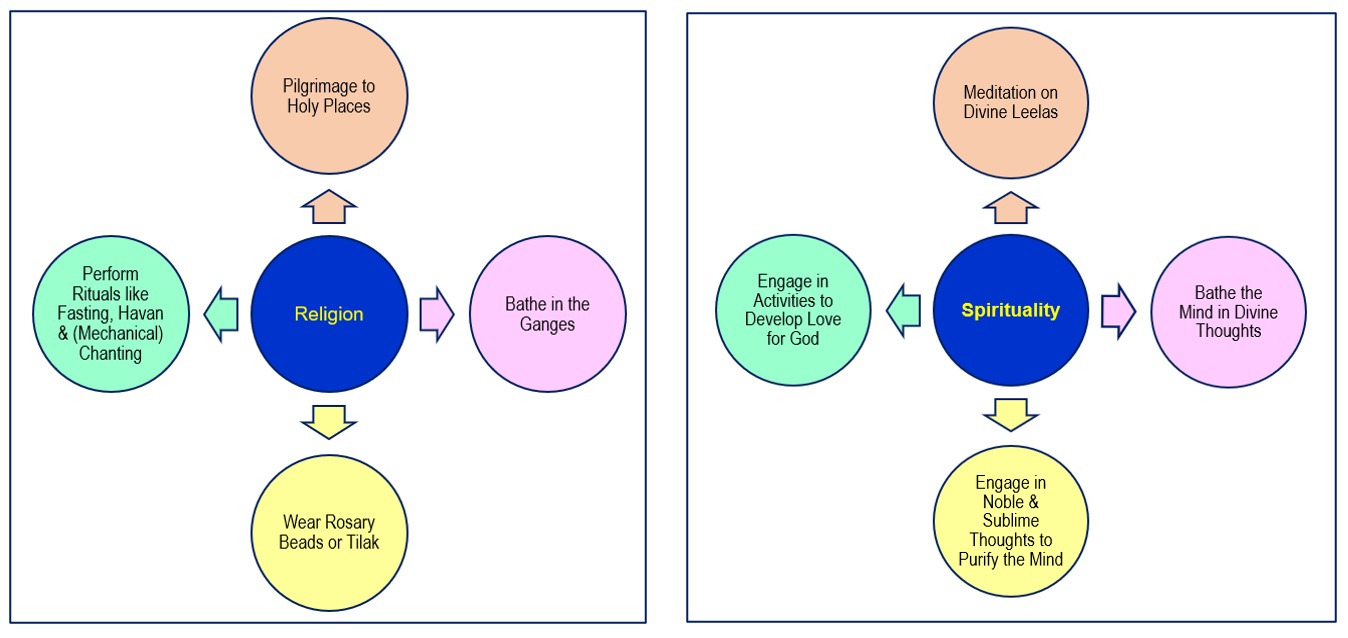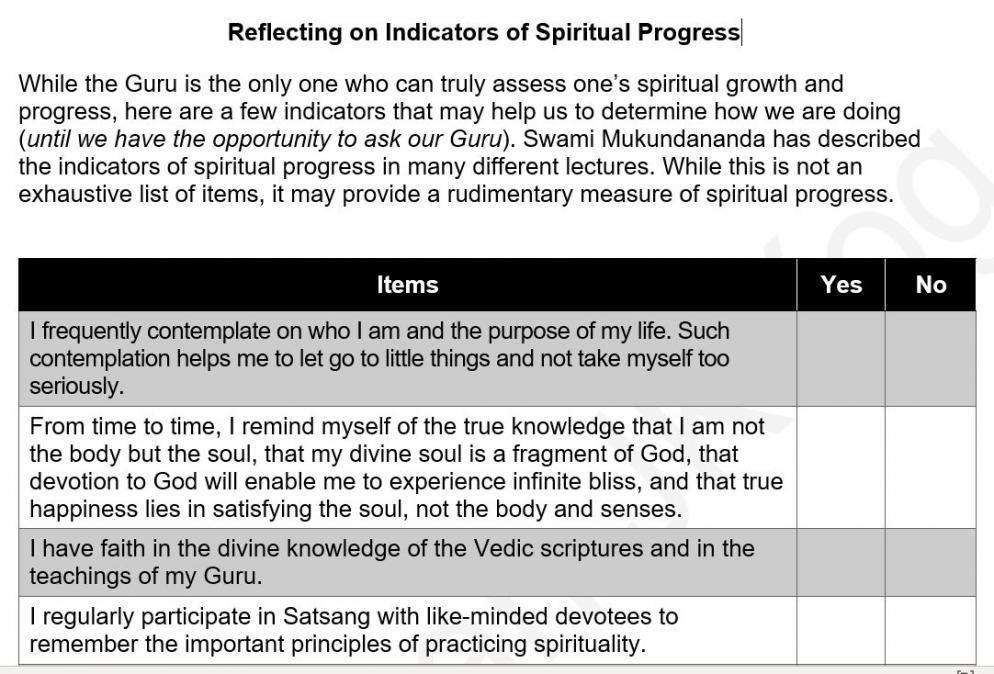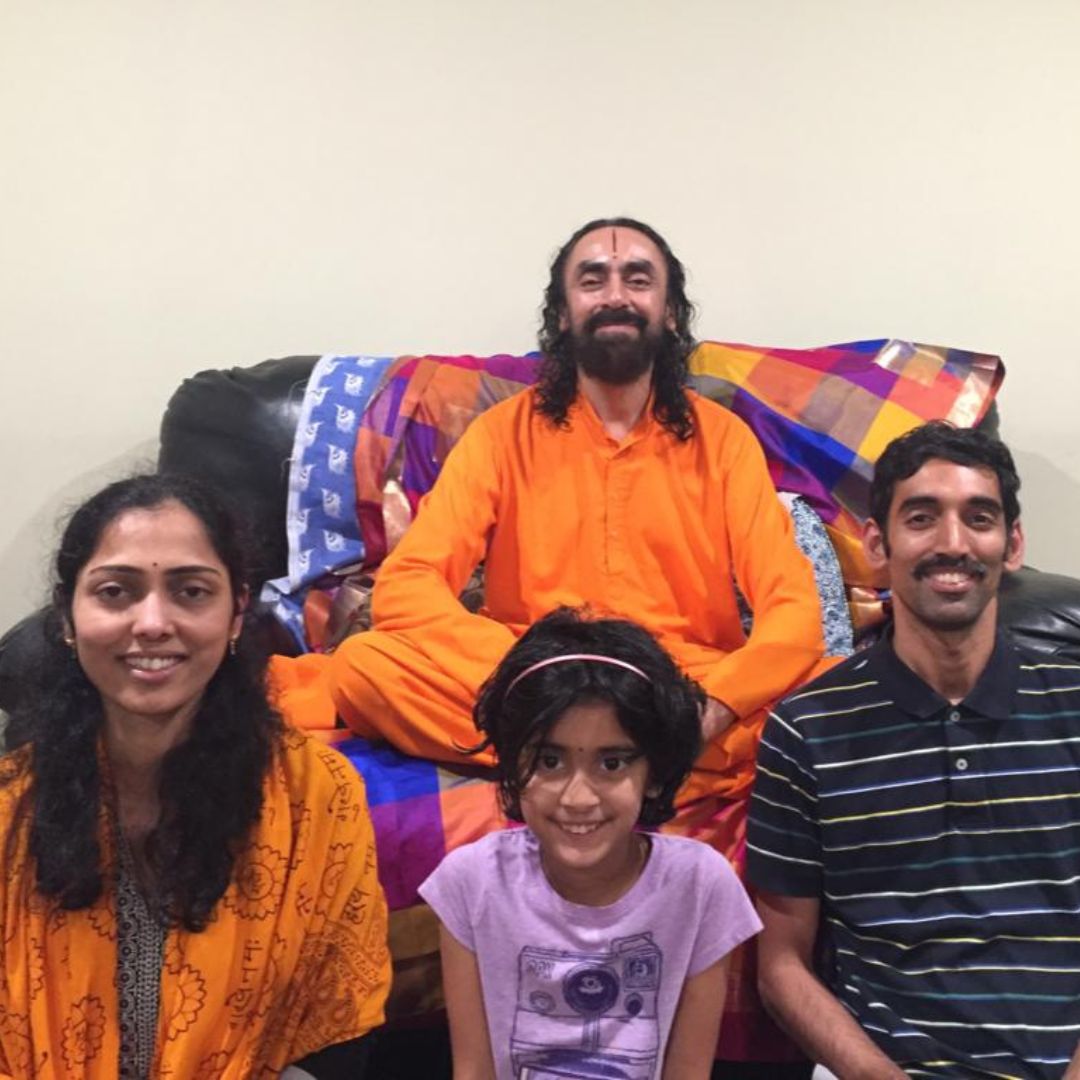
From the Editor’s Desk
The paradoxes associated with high-tech innovations has amplified the importance of spirituality in the modern world. People find themselves at a crossroad where digital solutions, virtual social networks, and material opulence no longer provide the kind of happiness that was once believed to be the source of all pleasures. The search for inner happiness cannot be fulfilled by external trappings but through internal resources. Inspired by Vedic knowledge (i.e., tatvagyan) taught by Swami Mukundananda, in this month’s Samarpan, we attempt to understand the importance of spirituality in the modern world for a more balanced and peaceful lifestyle.

Vedic Wisdom & Application
Challenge of the Month
Importance of Spirituality in the Modern World
Reflection Questions
- What is the Role of Spirituality in the Modern World?
- Why Should We Distinguish between Religion and Spirituality?
- How can We Practice Spirituality in the Modern World?
In this day and age of high-tech innovations and digital solutions, people find themselves at a crossroad of paradoxes. While technological advances have made life easier in many ways, they have also challenged us to find ways to remain relevant in a globalized economy. While the widespread surge of social media has successfully connected people all over the world, it has also resulted in increased loneliness at an individual level. As the material opulence of people seems to increase, their inner resources seem to deplete due to lack of guidance on ways to make life more meaningful. There has never been a greater need than now to connect with a higher source of consciousness to know one’s true identity and understand the purpose of life. Swamiji beautifully says that our soul yearns to connect with something sacred and higher than us because we are not material beings seeking a spiritual experience, but spiritual beings who are living a material experience in this world of Maya. For this reason, spirituality plays an important role in this modern world characterized by digital devices and tools that provide instant gratification of sensory pleasures.
What is the Role of Spirituality in the Modern World?
All major religions believe that human beings are a conglomerate of two distinct entities – the material body and the divine soul. The soul is a fragment of God, and its constitutional nature is to seek bliss from its infinitely blissful source. However, due to ignorance and the influence of the all-powerful Maya, souls falsely identify with the material body and indulge in sensory pleasures for immediate gratification. We need to take time to ponder over critical questions such as “Who am I? What is my purpose of my life? Where will I go after death?” Searching answers for these questions will automatically steer one toward the path of spirituality.
The modern world is superficially enchanting and provides abundant opportunities for material enjoyment. We are constantly bombarded by external stimuli from social media, television, internet, movies, and other people that influence our thinking and actions every minute. We tend to prioritize these mundane activities of life rather than spiritual practices such as sadhana (i.e., devotion to God) and seva (i.e., service to God and Guru) that uplift our soul. We make excuses of not having time to practice spirituality. However, it is not the lack of time, but failure to accord importance and prioritize spirituality over other mundane tasks, that is an obstacle for progress on this path. Thus, we pursue fame, power, money, talent, good looks etc., hoping that these allurements will make us happy. However, our Vedas repeatedly emphasize that chasing worldly happiness is like chasing a mirage; no matter how much we search in the material realm, we will never obtain the divine bliss that the soul is seeking. This is because the soul is seeking unlimited, infinite, and ever-lasting happiness, whereas all material pleasures are limited, finite, and short-lived. God is the source of infinite and eternal happiness, thus when we attach our mind to Him, our divine soul will experience divine bliss that it has been seeking since endless lifetimes. Spirituality teaches us to understand this basic principle, enabling us to determine our true priorities in life.
In ancient times, spirituality was the way of life since opportunities for material indulgence were limited. People spent most of their free time engaging in spiritual practices such as contemplating on God, reading divine scriptures, listening to oral narratives by preachers and religious music, and pondered over the purpose of life. However, over time, spirituality has declined because we have prioritized material accomplishments and sensory gratification over connection with God. When we experience temporary material pleasure, the illusion to seek more pleasure leads to greed, lust, and jealousy. When material desires lead us nowhere, we experience frustration, stress, disappointment, anger and grief. Thus, either way, in the modern world of gadgets and gizmos, the mind is trapped by mental afflictions that result in unfulfillment and dissatisfaction. Pursuit of spirituality will satisfy the soul and provide a roadmap to God-realization and divine bliss.
Additionally, practicing spirituality in the modern world has numerous benefits for the body, mind and soul. It improves energy levels, focus, clarity of mind and thought processes. It helps to reduce mental health ailments such as stress, depression, anxiety, and emotional exhaustion. Spirituality also helps to lead a more balanced and successful personal and professional life.
It is important to understand that it is spiritual practice, not religious rituals that will help us to deal with the challenges of the modern world. Thus, it is important to distinguish between religion and spirituality.
Why Should We Distinguish between Religion and Spirituality?
At the forefront of all differences, it is critical to understand that the practice of religion involves external rituals whereas the practice of spirituality is internal in nature. External rituals, unless accompanied by the mind’s attachment to God, is a mere physical drill, whereas spirituality is the internal connection of the mind to all things divine. Spiritual practices involve simple things like devotional chanting, hearing or reading divine knowledge of the scriptures, and meditating on the names, forms, virtues, pastimes, abodes and saints of God. The goal of these practices is to attach the mind to God/Guru.

While religiosity conforms to the prescribed norms as stated in the scriptures and practiced in society, spirituality conforms to recommended practices to purify the mind, cultivate ethical values, and understand and apply divine knowledge in order to develop love for God. Religiosity may please those who value external forms of worship, but spirituality pleases God/Guru because the goal is internal transformation, resulting in the elevation of the soul. While the goal of every religion in the world is to develop love for God, it has been observed that when rituals per se become the goal, devotion may be compromised in favor of the rituals that may not elevate the soul.
How can We Practice Spirituality in the Modern World?
- Obtain True Knowledge. The practice of spirituality begins with the knowledge that we are the divine soul rather than the material body. Then, we need to develop faith in the spiritual philosophy and practice. The modern world is firmly grounded on establishing beliefs based on evidence of causality. However, spirituality is an inner experience and modern material instruments of science are not sophisticated enough to prove the existence of the soul objectively. Thus, initially one must take a leap of faith and make an effort to believe and start practicing spirituality based on the teachings in the Vedic scriptures.
- Repeated Contemplation. We need to repeatedly contemplate to convince our mind about the true sources of happiness. The Bhagavad Gita and various scriptures tell us to establish a sadhana routine to remember God and Guru through meditation or roop-dhyan in isolation. This will help us to block out worldly consciousness from our mind and strengthen our devotional sentiment (see the November 2022 issue for a detailed explanation on contemplation). It is important to spend at least a few days per year in Satsang with our Guru as well, whenever our schedule permits.
- Regular Participation in Satsang. Satsang includes reading holy scriptures, chanting the names of God, singing kirtans, meditating on God’s divine qualities, listening to the words of saints, and/or contemplating on the ways to close the gap between spiritual goals and our current practice. Satsang is characterized by a congregation of devotees who engage in holy communion that helps to attach the mind anywhere in the Divine realm. It is the collective effort to free the mind from worldly distractions and focus the intellect on the names, virtues, pastimes, abodes and saints of God (see the June 2022 issue for a detailed explanation on the Power of Satsang).
- Seva or Service to God/Guru. As tiny fragments of the energy of God, we are constitutionally geared toward serving Him. Since endless lifetimes, we have become accustomed to serving our own selfish needs and desires and those of our loved ones. When we start to think about serving the Lord, the process of inner transformation begins. Swamiji teaches us that to attract divine grace, our seva must be selfless. It means that we must develop sentiments of humility (see the July 2021 issue for a detailed explanation on Selfless Seva).
- Renounce Fruit of Actions. We should do all types of work with the consciousness that, “I am doing this work for the pleasure of God/Guru, thus renouncing the fruit of my actions.” With this mindset, we will develop the consciousness of working for His pleasure and not look at any work as separate from devotion. This is the concept of Karmyog (see the September 2022 issue for a detailed explanation). As Shree Krishna states:
यत्करोषि यदश्नासि यज्जुहोषि ददासि यत् |
यत्तपस्यसि कौन्तेय तत्कुरुष्व मदर्पणम् || 27||
yatkaroṣhi yadaśhnāsi yajjuhoṣhi dadāsi yat |
yattpasyasi kaunteya tatkuruṣhva madarpaṇaṁ ||
Arjun! Whatever you do, whatever you eat, whatever austerities you perform, and whatever you give away, do it as an offering to Me. [BG 9.27]
- Surrender to God/Guru. The concept of intellectual surrender to God/Guru focus on six core principles: (a) To desire only in accordance with the desire of God; (b) Not to desire against the desire of God; (c) To have firm faith that God is protecting us; (d) To keep an attitude of gratitude toward God; (e ) To see everything we possess as belonging to God; and (f) To give up the pride of having surrendered. If we perfect these six points, we will fulfill God’s condition and He will bestow his grace upon us. We must strive to implement these daily.

Tools for Your Personal Growth
While the Guru is the only one who can truly assess one’s spiritual growth and progress, here are a few indicators of how we are doing on the spiritual path. Use the tool Reflecting on Indicators of Spiritual Progress to assess yourself. A downloadable tracking sheet available for you to use.

Use the tool Reflecting on Indicators of Spiritual Progress to assess your spiritual progress (until you have the opportunity to ask your Guru).

Love to Hear from You
- How did you apply the Vedic Wisdom?
- What challenges did you experience in the process?
Please share your comments under “Join the Discussion” below.

Gems of Wisdom from Swamiji
Here are a couple of YouTube video titles with related links where Swamiji describes the importance of spirituality in the modern world. His books are referenced as well.
- Mukundananda, S. (2022). The Power of Thoughts, Penguin Random House: Gurugram, India.
- Mukundananda, S. (2022). Bhagavad Gita – The Song of God, Westland Publications: Chennai, India.
- Mukundananda, S. (2021). 7 Divine Laws to Awaken Your Best Self, HarperCollins Publishers: Noida, India.
- Mukundananda, S. (2020). The Science of Mind Management, Westland Publications: Chennai, India.



Voices from the Global Community
JKYog’s e-Journal Samarpan, inspires the community by introducing you to members who have been impacted by the scriptural knowledge taught and disseminated by Swamiji. Two devotees, Murali & Sarada Pemmaraju and Rima Pant, describe how they practice spirituality in the modern world as influenced by Swamiji’s teachings.


We invite you to share your inspirations and success stories with us at secretary@jkyog.org.

Glimpses of Past Events
Want a glimpse of our recent exciting events? This month we share beautiful glimpses of memorable moments from two events last month.









